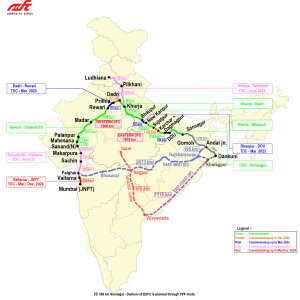The first freight train trial was conducted on the 401-km-long route between New Sahnewal and New Khurja section on 11 October.
With the successful trial run, the entire 1337-km-long Eastern Dedicated Freight Corridor (EDFC) is set to be ready for commercial operation from November.
The EDFC with a route length of 1,337 km starts from Sahnewal near Ludhiana (Punjab) and passes through Punjab, Haryana, Uttar Pradesh and terminates at Sonnagar in Bihar.
The Eastern Corridor will traverse through four states with maximum length in Uttar Pradesh, and Haryana having the least coverage.

Meant for mainly coal transportation to power plants, the EDFC was completed at an estimated cost of Rs 51,000 crore.
It is a landmark achievement, marking the completion of the entire EDFC of 1,337 km from Ludhiana to Sonnanagr, said Dedicated Freight Corridor Corporation Managing Director R K Jain.
The EDFC is expected to play an important role for coal transportation to power houses in Haryana, Punjab, and parts of Rajasthan.
Now about 70 freight trains would travel from New Sahnewal to Sonnagar seamlessly. Thus, there would be a total of 140 trains running up and down the route daily.
Earlier, it would take about 48 hours to cover the same distance on the Indian Railways route, but it will now take about 24 hours only, as per Jain.
The speed of the train is also expected to increase from 25 kilometres per hour (kph) on the Indian Railways route to about 50 kph, cutting down the time required for transporting the goods.
Jain said the project cost was escalated from the original sanctioned cost due to the increased land cost. The land was purchased at Rs 20,000 crore as against the original sanctioned cost of Rs 8,000 crore.
As for the western DFC, he said 95 per cent of the work will be completed this fiscal and it will be fully functional next year with the completion of the remaining section.
The Deen Dayal Upadhaya junction was revamped for EDFC with eight new lines at the DFC yard.
While 4,619 hectares of land was acquired for EDFC, 6,000 hectares were acquired for western DFC.
In eastern DFC, there are 2,061 minor bridges, 213 major bridges, 166 rail over-bridges, 214 rail under bridges, and 24 rail flyovers. There are 66 stations in EDFC.
The Dedicated Freight Corridor Corporation is at an advanced stage of completion. At present, 2,383 km, which is 83.8 per cent of a total length of 2,843 km, has been commissioned.
The DFCC project has picked up momentum post-2014-15 with expeditious land acquisition, contract finalisation, and continuous support by the Ministry of Railways.
It includes 1,046 km in the western DFC and the entire EDFC of 1,337 km. More than 95 per cent of the total DFC will be completed by March 2024.
Until now, more than 130,000 trains have already traversed the DFC network since commissioning of the first section, while approximately 74,000 freight trains have moved on the EDFC till September 2023.
Likewise, nearly 56,000 trains have moved on the western DFC from the start of operations.
With the operationalisation of EDFC, the coal transit time from the coalfields of eastern India to the power plants of northern India has been reduced by 30-40 per cent, leading to a significant reduction in the inventory costs of power plants.
Now, with the commissioning of this remaining section, these positivities will be further augmented.
Similarly, with the extensive running of trains over western DFC, the freight transit time between the ports of western India and northern India has been reduced by almost 50 per cent.
A classic example of the same was seen in the successful transportation of perishable commodities like milk in much-reduced time from the dairies of Gujarat to the NCR (National Capital Region).
DFCC is on a relentless journey of growth and progress as it continually integrates new sections into its extensive network.
In the current fiscal year, it is running more than 230 trains per day.
DFC has also achieved impressive average speeds, with the highest recorded at 99.82 kph.
DFCC has an average speed of 50-60 kph, much higher than that of Indian Railways.
It is meeting the augmented demand of existing commodities of the Indian Railways basket.
The ‘Trucks on Train’ service has been relaunched. An agreement has been signed with a leading e-commerce giant for small cargo transportation between western DFC’s New Palanpur and New Rewari stations.
All the DFCC stations are economic activity centres and DFCC is undertaking the development of additional terminals for handling rail cargo under the new Gati Shakti Multi-Modal Cargo Terminal Policy 2022.
DFC is a vital cog in the National Logistics Policy, which aims to reduce the cost of logistics from 15 per cent of the country’s GDP to 8 per cent by 2030.
The freight infrastructure capacity augmentation by DFC is crucial in the achieving of Indian Railways’ target of 3,000 million tonnes freight loading by 2027.


